Poor showing at state polls may strain shaky relations for parties in Malaysia's unity government
Ties between Prime Minister Anwar Ibrahim's Pakatan Harapan and Ahmad Zahid Hamidi's Barisan Nasional have come under the spotlight after the opposition Perikatan Nasional made inroads in states held by the unity government.
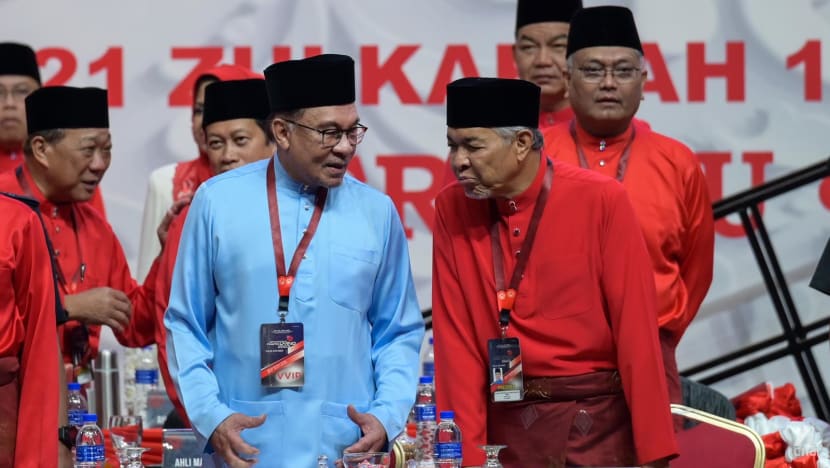
United Malays National Organisation (UMNO) president Ahmad Zahid Hamidi (right) and Prime Minister Anwar Ibrahim speaking to one another at the opening of UMNO's general assembly on Jun 9, 2023. (Photo: CNA/Fadza Ishak)
ALOR SETAR, Kedah: Disappointing results among parties in Malaysia’s unity government at last weekend’s state election could strain the shaky relations between Mr Anwar Ibrahim’s Pakatan Harapan (PH) coalition and Ahmad Zahid Hamidi’s Barisan Nasional (BN), with observers noting the latter as a liability in the political tie-up.
Political observers say there are several other issues that could unnerve the fledgling partnership that began as a marriage of convenience to form a government following an impasse after Malaysia’s general election last year.
One factor is how the United Malays National Organisation (UMNO) - a main component party of BN that contested in the election - may be feeling disgruntled at getting the shorter end of the stick from its partnership with PH in the unity government.
For instance, some believe that UMNO should have been given the chief minister post for the Negeri Sembilan state government, and that its partnership with the Democratic Action Party (DAP) has alienated the party from its own grassroots and supporters in the Malay heartland.
These issues, including even a lack of agreement over petitioning for a royal pardon of jailed former PM Najib Razak, have raised questions on increased tensions between PH and BN that could boil over and lead to both sides even going their separate ways for the next General Election due by November 2027.
Political analyst Jeniri Amir, a senior fellow with the National Professors Council, told CNA that both PH and BN must engage in compromise and tread around sensitive issues carefully if they wished to contest the upcoming national polls as a bloc.
“In theory the partnership between PH and BN may be a formidable one, with PH having strong support in urban areas and among ethnic minorities, while UMNO - if they can rekindle their strong influence among Malay voters - have the strongest election machinery in the country," said Dr Jeniri.
"But there are many issues and problems that may surface which threaten to derail this partnership," he added.
IMPACT OF STATE POLLS ON PH-BN UNITY
The state polls overall results unfolded as what many analysts predicted - a 3-3 status quo score with the unity government defending the states of Selangor, Penang and Negeri Sembilan while the Perikatan Nasional (PN) opposition continue to hold control of Kedah, Kelantan and Terengganu.
However, a deeper look at the results shows that PN made major inroads in the states held by the unity government, boosting its presence in the state legislative assemblies of Selangor from five to 22, in Penang from one to 11 and in Negeri Sembilan from zero to five.
PN has also now denied the unity government coalition a two-thirds majority in Selangor, Malaysia’s richest state which has long been considered a bastion for PH.
Saturday’s (Aug 12) results were particularly dismal for BN’s UMNO, which lost in 89 out of the 109 seats it contested.
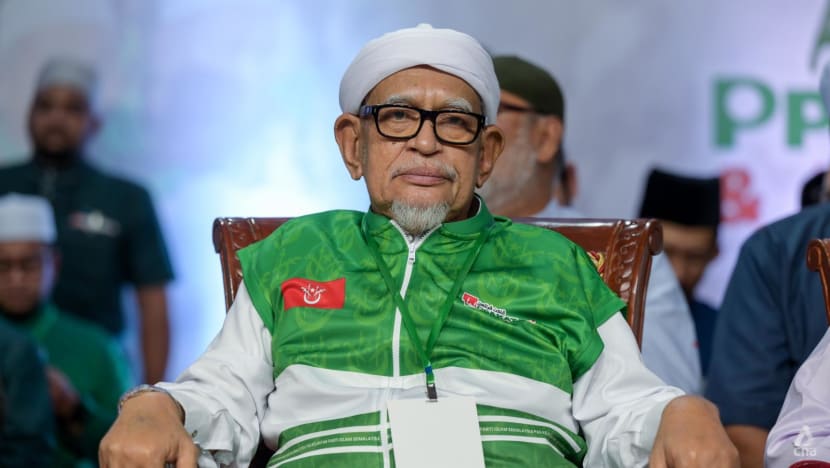
The results have prompted Parti Islam Se-Malaysia (PAS) chief Abdul Hadi Awang to outline that PN can seize control of the government at the federal level amid disunity in the ranks of PH-BN. PAS is a main component party in PN.
“(The results show) that the people have voted in protest against the PH-BN alliance. Even though PN fell short of controlling three states, a change in government can still happen,” Mr Abdul Hadi told reporters in a press conference on Sunday night.
“We know that the DAP is undergoing an internal crisis, seen in issues relating to picking candidates for state polls, attacking UMNO during campaigning and more,” he said.
“So their alliance is not strong, the stable coalition at present is only PN,” added the member of parliament (MP) for Marang constituency.
RIFT OVER APPOINTMENT OF NEGERI SEMBILAN CHIEF MINISTER
Following the polls, federal MP from Mr Anwar’s Parti Keadilan Rakyat (PKR) Wong Chen said that the formula for future PH-BN victory was in how the alliance performed in the state of Negeri Sembilan.
PH-BN nabbed 31 out of 36 seats in the state legislature.
“While PH-BN needs a detailed review of what went wrong in other states, I would stress that the more important move is to study and adopt the PH-BN model in Negeri Sembilan,” Mr Wong wrote in a Facebook post.
Ironically, with victory in hand, the process of naming the state’s chief minister and forming the government have triggered rifts between the camps of PH and BN.
On Monday afternoon, PKR’s Aminuddin Harun was reappointed chief minister by Negeri Sembilan state ruler Tuanku Muhriz Tuanku Munawir. Mr Aminuddin said on Sunday that it was the prerogative of Mr Anwar and coalition chiefs to decide on a name to nominate to the ruler.
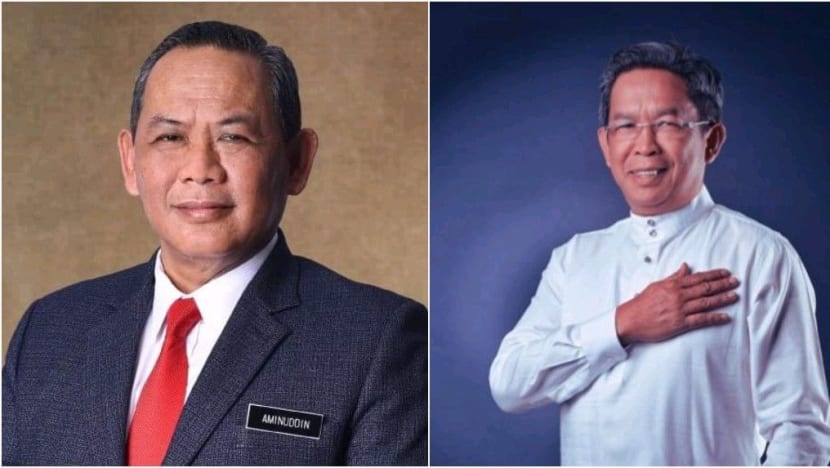
However, an UMNO state assemblyman who spoke on condition of anonymity told CNA that the party had harboured hope that UMNO state chief Jalaluddin Alias be given the post instead.
“UMNO (is the party that) won the most seats in the state assembly so the post should have been offered to Datuk Jalal first,” said the state assemblyman.
“PH alone would not have won a simple majority in Negeri Sembilan, and UMNO was instrumental in delivering the state,” the assemblyman added.
Of the 31 seats won, UMNO clinched 14 seats. PH’s 17 seats are spread across its different component parties - 11 seats for DAP, five seats for PKR and one seat won by Parti Amanah Negara (Amanah).
Political analyst Dr Jeniri Amir acknowledged that Mr Aminuddin’s appointment has created tension between PH and BN.
He said that Mr Anwar should have appointed Mr Jalaluddin as an olive branch to BN for its efforts to the unity government alliance in the state polls, and to maintain harmony at the federal level.
“I think there needed to have been a compromise in lieu of cooperation. DAP is heading the Penang government, and PKR would control Selangor.
“I think to be seen as giving parties equal footing, he should have given Negeri Sembilan to UMNO,” added Dr Jeniri.
UMNO LOSING VOTER BASE OVER COOPERATION WITH DAP
Another point of contention is how UMNO’s vote share among the Malay voters was decimated during the state polls, and some party leaders have attributed this to BN's alliance with PH, in particular with the multi-ethnic-based party DAP.
UMNO supreme council member Isham Jalil told CNA that the party’s alliance with DAP has chipped away its popularity among its main voter base - the Malay Muslim majority.
Of the 89 seats BN lost in the polls, a majority of them were in the Malay heartland, located across Kelantan, Terengganu, Kedah as well as rural or semi-urban parts of Selangor.
“Being partners with DAP is a sensitive issue for UMNO supporters and grassroots leaders. In light of this, what we can see is that many UMNO supporters and grassroots have voted in protest against PH or BN and voted for PN instead,” said Mr Isham, who is former UMNO information chief.
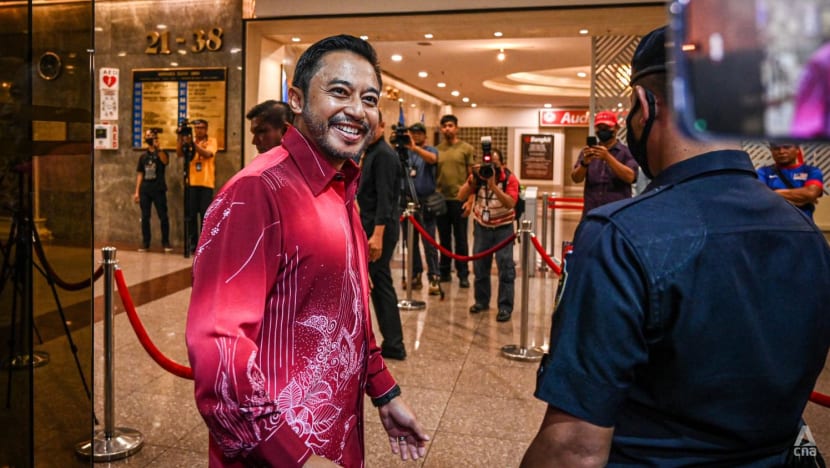
He said that the party leadership must now consider whether to continue working with DAP for subsequent polls.
“We can choose to continue working with DAP in the government but perhaps go at it alone during subsequent elections. This will allow UMNO to rebuild the party by maintaining its original ethos and ideology,” said Mr Isham.
Dr Jeniri concurred with these sentiments, highlighting that it is difficult for UMNO to reconcile its partnership with PH and DAP, when it has for many decades while it was in power, labelled them as a threat to Malay nationalism.
“UMNO has been bombarding the minds of Malay voters that DAP is the enemy. Now how can they convince the Malay voters to vote UMNO when they are working alongside DAP and being associated with PH?” he added.
However, former DAP MP Ong Kian Ming was more sanguine for future cooperation between DAP and UMNO.
“While substantive electoral dividends between UMNO and DAP may take a while to solidify, we can see two examples in Selangor where this partnership has paid dividends,” said the senior visiting fellow at the ISEAS-Yusof Ishak Institute.
Dr Ong gave an example of the mixed seat of Dusun Tua in Selangor, which was a DAP seat that was given to UMNO to contest. He said the UMNO candidate won largely due to strong support from the non-Malay community.
Dr Ong also outlined how an ethnic Chinese DAP candidate managed to win the Malay majority seat of Sungai Pelek in Selangor with help from UMNO local leaders, including Minister for Investment, Trade and Industry Tengku Zafrul Aziz.
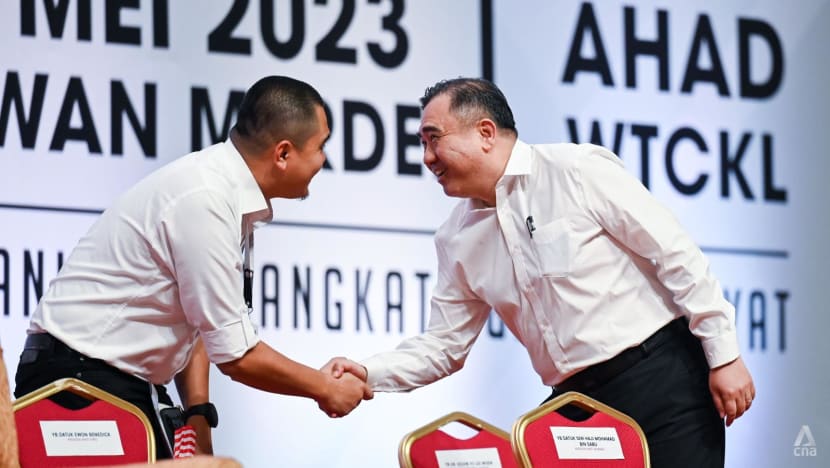
Yet, Mr Isham - the UMNO supreme council member - maintained that in the bigger picture, his party remains the biggest loser in this partnership.
He suggested that if BN were to continue the partnership alongside DAP in subsequent electoral contests, it might continue to win the support of some PH supporters in each seat, but stand to lose more of its own supporter base - many of whom are Malay Muslims.
“With UMNO chasing the votes of 500 DAP supporters, we lose 5,000 votes from our own supporters and grassroots,” he said.
WILL NAJIB PARDON ISSUE BE TIPPING POINT FOR PH-BN RELATIONS?
Following the state polls results, Mr Isham has also reiterated calls for former prime minister Najib Razak to “be given justice” in the form of a “fair trial”.
The issue of Najib's freedom is an emotive one for both PH and BN.
Many BN leaders feel that Najib deserves a royal pardon as they believe that the prosecution of the former BN chief for 1MDB-related matters is unjust.
Meanwhile, PH's key ethos is to uphold integrity and incorruptibility. The coalition's historic victory in the 2018 General Election came on the back of the people's frustration against Najib's involvement in the 1MDB scandal.
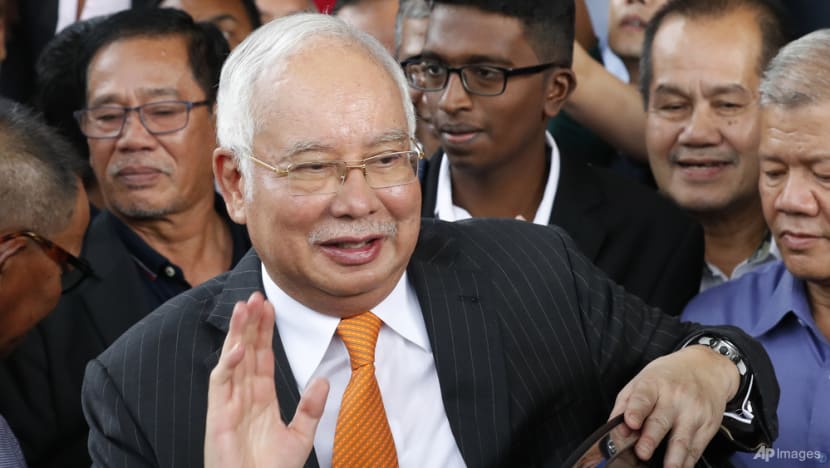
Najib is currently serving a 12-year jail sentence after being convicted of misappropriating RM42 million (US$9.1 million) belonging to SRC International, a former 1MDB subsidiary.
The former UMNO chief continues to have major influence and support among party leaders and is seen as a key unifying figure.
“It has been a year since Datuk Seri Najib has been imprisoned and there has not been any justice for him,” Mr Isham told CNA.
He suggested that BN might have stood a better chance in recent polls if Najib had been campaigning alongside UMNO candidates.
In April, UMNO announced that it was submitting a petition for a royal pardon for Najib to Malaysia’s King Al-Sultan Abdullah Ri'ayatuddin Al-Mustafa Billah Shah.
DAP chief Anthony Loke later stressed that the petition was a party matter within UMNO, and not the stance of the unity government.
DAP members have also been quoted by local media as saying that expediting or supporting a pardon for Najib is a red line they are not willing to cross as partners in the unity government.
The royal pardon is determined by a Pardon Board, which is chaired by the king. Prime Minister Anwar is also a member of the board.
Analyst Dr Jeniri stressed that if the unity government pushes for Najib to be pardoned, this might appease BN supporters.
But he stressed that the move could trigger discontent among Anwar’s PH partners, as Najib’s pardon is seen as a non-negotiable compromise for some leaders.
“Najib is a popular figure not only inside UMNO but also outside the party. He has an aura, he can boost support towards the unity government,” said Dr Jeniri.
“But I don't think pushing for a pardon is doable and palatable at this juncture,” he added.
Commenting on how PH-BN ties might unfold post-state elections, political analyst Hafidzi Razali acknowledged that the two coalitions will always have significant issues to navigate around.
The associate director with strategic advisory firm Bower Group Asia acknowledged that the clout over Najib's case could haunt ties. He added there will continue to be clashes in matters relating to policies, political appointments and electoral seat negotiations.
However, Mr Hafidzi maintained that there is a possibility for a strong partnership if both sides learn to compromise.
"In the context of the different issues that arise, there will be concessions needed. But the hope for PH-BN is that their leaders find a win-win scenario when these issues arise," said Mr Hafidzi.



















